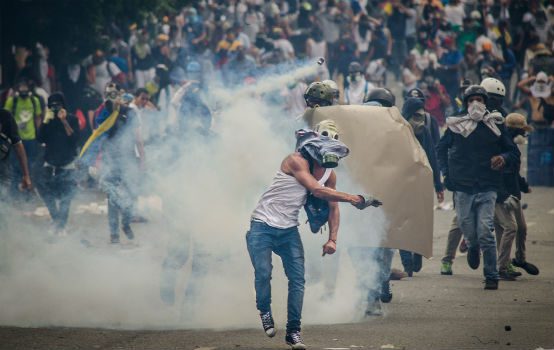Why Intervention in Venezuela Must Be Rejected

Ben Denison considers how successful an intervention in Venezuela is likely to be if it happens:
In November, national security adviser John Bolton gave a speech in which he called Venezuela part of the Western Hemisphere’s “troika of tyranny.” The Trump administration announced Wednesday that “all options are on the table” for Venezuela, refusing to rule out military intervention.
So far, there are no signs that military intervention is being planned. But academic research shows that any effort to overthrow the Maduro regime is most likely to end with the U.S. military occupying the country for a long time, whether policymakers planned for it or not.
Regime change wars rarely work out as their supporters expect, and they are always more costly for the U.S. and the other country than anyone anticipates. Even when the regime is successfully toppled, the ensuing chaos and violence can do enormous harm to the civilian population. If Trump were to order an invasion of Venezuela, it would be the beginning of a long-term commitment of a large number of troops in a country where they aren’t wanted. Supposing that the opposition leader Guaido were to request U.S. intervention, that wouldn’t change the reality that millions of Venezuelans would oppose our military presence and many of them would resist it violently.
Military intervention in Venezuela would normally be very unlikely, but in an administration where the president has repeatedly floated the idea we have to take the possibility seriously. Absolutely no U.S. interests would be served by a Venezuelan war, and it would rank as one of the stupidest wars of choice that the U.S. has ever fought. It goes without saying that it would be illegal. Venezuela is an economic basketcase and a humanitarian crisis, but its government poses no threat to the U.S. and who governs the country is not a matter of vital importance to us.
If the U.S. chose to militarize the crisis, it would be responsible for driving Venezuela into a state of war that does not yet exist:
“Militarizing the crisis in Venezuela would require going basically from 0-100,” tweeted Dan Trombly….“The disorganized and largely non-violent VZ opposition would be unable to match even Libya’s incoherent militia patchwork anytime soon and would very likely require foreign ground support.
“Precisely because Venezuela is *not* yet in a civil war, there is very little the US could even fantasize about doing to strike VZ or militarily help along this opposition without sliding into a full-blown Iraq-like effort to collapse existing Venezuelan state institutions.”
The administration keeps saying that “all options are on the table,” but militarizing Venezuela’s crisis is one option that should be firmly ruled out.
Comments